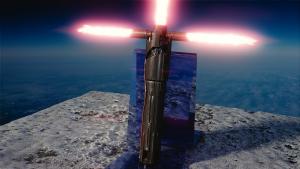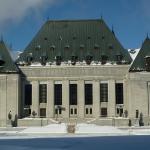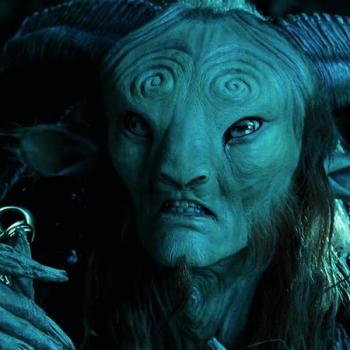
Last weekend, I watched “Star Wars: The Last Jedi” for the third time. As I wrote back in December, I think it’s a pretty good movie, and I really like the fact that it was willing to shake up the status quo (notwithstanding the outraged braying of a thousand fanboys). You won’t find me saying that it killed the Star Wars franchise or drained any enthusiasm for future installments…though I’ll admit the movie has certain flaws that become only too apparent on subsequent viewings.
But I’ll give the TLJ haters this: it’s not terribly clear where the saga can realistically go from here. Sure, we get some inspirational slogans about the rebirth of the Rebellion, about the spark of hope, and so on—but it’s not obvious that things are building toward a powerful, emotionally satisfying conclusion. We seem to be in for a lot of galactic meandering, more-or-less-relevant subplots, and rehashing of old story beats.
This isn’t inevitable, though. In fact, the saga has set itself up nicely for a groundbreaking reveal in its ninth installment, one that would be both narratively satisfying and thematically intriguing: what if there’s no such thing as inborn “Force sensitivity”? What if EVERYONE, at least in theory, has the potential to become a Jedi or Sith?
Yes, yes, this revelation would radically alter the philosophical underpinnings of the saga. It would make a lot of people mad. It would force all preceding films to be viewed in a somewhat different light. There’s no way Lucasfilm’s czar, Kathleen Kennedy, would be down for such a twist. And yet, this move would be altogether consistent with the direction the series has been trending.
In Episode I and its fellow prequels, we are introduced to the “institutional Jedi Order”—a council of sages who, drawing upon years of teaching and philosophy, discipline and regulate the use of the Force. (We also hear Qui-Gon Jinn pontificate on the theory of “midichlorians” and their connection to Force sensitivity, but it’d be easy to retcon this as purely speculative.) By Episode III, we see the shattering of the Jedi and the total breakdown of the Order’s institutional framework: no lattice of abstract Jedi precepts can survive against the combined threats of war, betrayal, and the taint of the dark side.
But Anakin Skywalker’s treason doesn’t entail the end of the Jedi. In place of a single unified entity, a constellation of independent Force-wielding figures emerges: Obi-Wan Kenobi on the desert world of Tatooine, Yoda on the swamp planet Dagobah, and many others. Each understands the Force, and the role of the Jedi, somewhat differently; each, however, continues to identify as a Jedi. The essential tenet of the Order—that the Force is only properly understood and embraced within the context of the Jedi system—remains intact.
Fast forward to 2015’s “The Force Awakens” and 2017’s “The Last Jedi.” We meet a world-weary Luke Skywalker, an aging master who’s not simply skeptical of the Jedi Order, but of the Jedi teachings themselves. (It’s surely no coincidence that Luke refers to “the Jedi religion”—a phrasing not used since the original 1977 film.) By TLJ’s end, however, Luke seems to have regained his faith, vowing that he “will not be the last Jedi.” The threat of nihilism is averted.
If it’s not already obvious, in this progression we see clear echoes of the “genealogy of modernity”—the process by which ancient, medieval, and early modern ideas of God, creation, and morality gave way to contemporary secularity. We see the breakdown of spiritual authority against a backdrop of massive wars, the emergence of individualized approaches to belief (the “Force philosophies” of Qui-Gon, Obi-Wan, and Yoda are quite divergent), and finally the temptation toward a threadbare “spirituality without religion.”
“The Force does not belong to the Jedi,” Luke growls midway through TLJ. “To say that if the Jedi die, the light dies, is vanity. Don’t you see that?” His words recall the “Death of God” movement in 20th-century theology, which taught that the Incarnation was the ultimate act of God’s “self-emptying” into the world. As a result, “Death of God” proponents argued, we no longer need God in order to live well. To assert otherwise would be vanity—the scandal of religious particularism in an era beyond such primitive ideas. (To be sure, in the closing minutes of TLJ, Luke seems to be headed in a more “orthodox” direction. That said, his turn back towards the Jedi comes only after the destruction of a systematized and rigorously-theorized faith—epitomized onscreen by the burning of the tree seemingly containing the “sacred Jedi texts.” Make of that what you will.)
For this reading to work, in its fullest and most compelling sense, one piece only is missing: the big reveal that the story of the Jedi and the Force is, at a deep level, everyone’s story. Such a turn would raise huge, meaningful questions: Do Rey and her peers have a duty to put the galaxy on notice that all have equal access to the Force—that they are part of the saga’s priesthood of all believers”? To spread such a message would be to offer the cosmos a profound hope—the hope that transcendent truth is not simply restricted to a “spiritual elite”—but also to risk that others will end up like Luke: disillusioned, despondent, so distracted by temporal concerns that their faith flags. It is to risk the rise of a populist “faith” infected by hyper-individualistic Sith philosophy, one that makes the individual the measure of morality and neglects the importance of Jedi restraint. It is, in short, the challenge Protestantism has faced since its inception.
What is the relationship between individual salvation and the weight of tradition? What is the norming authority for faith? What are the communities that define us—or those within which we attempt to define ourselves? These are world-shaking questions, and (perhaps surprisingly) “Star Wars” is uniquely poised to engage them.
(I’m sure no one from Lucasfilm will read this—but hey, if it turns out I’m wrong, I’m happy to write up this screenplay for y’all!)
















